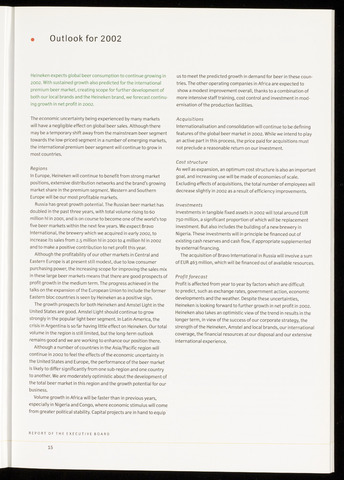Outlook for 2002
Heineken expects global beer consumption to continue growing in
2002. With sustained growth also predicted for the international
premium beer market, creating scope for further development of
both our local brands and the Heineken brand, we forecast continu
ing growth in net profit in 2002.
The economic uncertainty being experienced by many markets
will have a negligible effect on global beer sales. Although there
may be a temporary shift away from the mainstream beer segment
towards the low-priced segment in a number of emerging markets,
the international premium beer segment will continue to grow in
most countries.
Regions
In Europe, Heineken will continue to benefit from strong market
positions, extensive distribution networks and the brand's growing
market share in the premium segment. Western and Southern
Europe will be our most profitable markets.
Russia has great growth potential. The Russian beer market has
doubled in the past three years, with total volume rising to 60
million hi in 2001, and is on course to become one of the world's top
five beer markets within the next few years. We expect Bravo
International, the brewery which we acquired in early 2002, to
increase its sales from 2.5 million hi in 2001 to 4 million hi in 2002
and to make a positive contribution to net profit this year.
Although the profitability of our other markets in Central and
Eastern Europe is at present still modest, due to low consumer
purchasing power, the increasing scope for improving the sales mix
in these large beer markets means that there are good prospects of
profit growth in the medium term. The progress achieved in the
talks on the expansion of the European Union to include the former
Eastern bloc countries is seen by Heineken as a positive sign.
The growth prospects for both Heineken and Amstel Light in the
United States are good. Amstel Light should continue to grow
strongly in the popular light beer segment. In Latin America, the
crisis in Argentina is so far having little effect on Heineken. Our total
volume in the region is still limited, but the long-term outlook
remains good and we are working to enhance our position there.
Although a number of countries in the Asia/Pacific region will
continue in 2002 to feel the effects of the economic uncertainty in
the United States and Europe, the performance of the beer market
is likely to differ significantly from one sub-region and one country
to another. We are moderately optimistic about the development of
the total beer market in this region and the growth potential for our
business.
Volume growth in Africa will be faster than in previous years,
especially in Nigeria and Congo, where economic stimulus will come
from greater political stability. Capital projects are in hand to equip
us to meet the predicted growth in demand for beer in these coun
tries. The other operating companies in Africa are expected to
show a modest improvement overall, thanks to a combination of
more intensive staff training, cost control and investment in mod
ernisation of the production facilities.
Acquisitions
Internationalisation and consolidation will continue to be defining
features of the global beer market in 2002. While we intend to play
an active part in this process, the price paid for acquisitions must
not preclude a reasonable return on our investment.
Cost structure
As well as expansion, an optimum cost structure is also an important
goal, and increasing use will be made of economies of scale.
Excluding effects of acquisitions, the total number of employees will
decrease slightly in 2002 as a result of efficiency improvements.
Investments
Investments in tangible fixed assets in 2002 will total around EUR
750 million, a significant proportion of which will be replacement
investment. But also includes the building of a new brewery in
Nigeria. These investments will in principle be financed out of
existing cash reserves and cash flow, if appropriate supplemented
by external financing.
The acquisition of Bravo International in Russia will involve a sum
of EUR 463 million, which will be financed out of available resources.
Profit forecast
Profit is affected from year to year by factors which are difficult
to predict, such as exchange rates, government action, economic
developments and the weather. Despite these uncertainties,
Heineken is looking forward to further growth in net profit in 2002.
Heineken also takes an optimistic view of the trend in results in the
longer term, in view of the success of our corporate strategy, the
strength of the Heineken, Amstel and local brands, our international
coverage, the financial resources at our disposal and our extensive
international experience.
REPORT OFTHE EXECUTIVE BOARD
15

